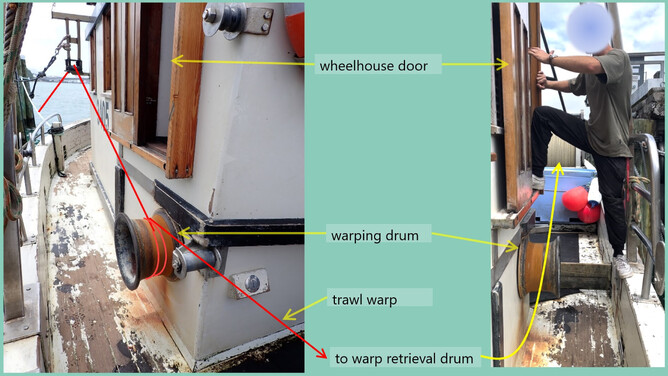NB: The below is a brief plain English summary of key points in the report. The Commission's report speaks for itself - you can download the full document here:
www.taic.org.nz/inquiry/mo-2022-207
What happened
The Danish seine fishing vessel Boy Roel was fishing in the Bay of Plenty. While a net was being hauled from the seabed, the skipper climbed over the top of a winch to access the wheelhouse. The skipper’s leggings became caught and was drawn into the rope that was hauling in the net as the rope wound around the winch drum.
The skipper sustained multiple fractures and head injuries.
Why it happened
The winch could only be controlled from the wheelhouse; there were no remote means to stop it operating in cases of emergency. The skipper was in a rush to access the wheelhouse and was distracted as they climbed over the winch. The bottoms of the skipper’s waterproof leggings were unsecured. This allowed them to be drawn into the rope as it wound around the winch.
What we can learn
Unguarded winch arrangements on fishing vessels are hazards that must be thoroughly assessed to reduce the risk of harm.
Seafarers should avoid climbing over unguarded moving machinery and ropes and rigging under tension.
Loose clothing is a significant hazard when working around running machinery.
Vessel operators should thoroughly assess risks to identify and control all hazards that could result in harm.
Who may benefit
Fishers and all other seafarers, fishing boat operators and anyone who works around moving machinery, may benefit from the findings in this report.
Safety actions
The operator has taken action to address the safety issues identified by the Commission. No new recommendation has been made.
No repeat accidents – ever!
The principal purpose of the Transport Accident Investigation Commission is to determine the circumstances and causes of aviation, marine, and rail accidents and incidents with a view to avoiding similar occurrences in the future, rather than to ascribe blame to any person. TAIC opens an inquiry when it believes the reported circumstances of an accident or incident have - or are likely to have - significant implications for transport safety, or when the inquiry may allow the Commission to make findings or recommendations to improve transport safety.
